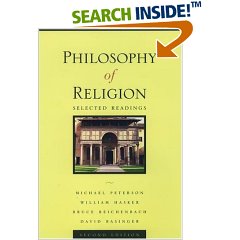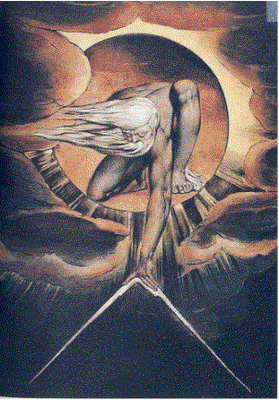
Northwest Christian College
PHL 320
PHILOSOPHY OF RELIGION
Fall, 2006
Beth Bilynskyj, instructor
TTh 1:00-2:15
A202
Description of Course:
As the editors of our textbook (Peterson, Hasker, Reichenbach and Basinger) point out, “Philosophy of religion…is not a discipline finding its home within some specific religious tradition. It is an area of genuinely philosophical activity that seeks to be as objective and intellectually rigorous as possible, to analyze the major ideas of religion and theology, to synthesize them into a coherent point of view, and to assess the sorts of reasons that thoughtful people have offered for and against religious belief.”
This course will provide a foundation for some of the basic issues in Western philosophy of religion, and introduce students to some classic and contemporary texts from this tradition. Specifically, we will examine the following topics,
Faith and reason: how are they related? Is it possible for them to exist together?
The theistic God and His attributes: omniscience, omnipotence
--the Homer Simpson Question, “Could Jesus microwave a burrito so hot that He Himself could not eat it? How can God know everything, and be all powerful, and yet humans be free?
Natural theology or Reformed Epistemology—it there evidence for God’s existence? if not, can belief still be rational?
Classic arguments for the existence of God—Ontological, cosmological, teleological, and moral
Religious experience--what does it mean to encounter ultimate reality? What value is subjective experience of God?
The problem of evil –does the existence of evil mean that an all-good, all powerful God doesn’t exist?
Miracles—does this concept make any sense? if so, how?
life after death –does this even make sense? If so, how could it be possible?
religious pluralism and personal faith—do all roads lead to God?
In the spirit of full disclosure, the instructor’s training is from the analytic tradition, (as opposed to the continental tradition) and she is a committed, practicing Christian.
Purpose of Course:
1) To provide a fundamental part of a Christian liberal arts education, integrating NCC’s biblical and Christian studies with rigorous philosophical study.
2) To understand the concepts, arguments and positions in philosophy of religion by reading texts from both classical and contemporary sources.
3) To critically reflect on these concepts, arguments and positions through oral and written assignments.
4) To prepare students for effective and successful roles in ministry, teaching, counseling, science and technology, by giving them an opportunity to reflect on the issues of the philosophy of religion.
.
Course Objectives:
Upon completing this course, you will be able to:
1) describe some of the central concepts and issues in the philosophy of religion
2) analyze and critically evaluate those concepts, arguments and positions.
3) begin formulating your own answers to key questions about God, faith, reason, evil, human freedom, miracles, personal survival, and religious diversity.
Textbook and Resource material:
Required:
(on Reserve) Philosophy of Religion: Selected Readings, 2nd Edition, edited by Michael Peterson, William Hasker, Bruce Reichenbach and David Basinger (Oxford: Oxford University Press, 2001)
NOTE: this text has gone into a third edition, and lost several important papers that are only available in the second edition. As the NCC bookstore does not deal in used books, you will either need to refer to the one on reserve in the Kellenberger Library or secure a copy on your own. If you decide to get your own copy, here are some good resources for used books, in addition to Amazon:
http://www.bookfinder.com/
http://www.fetchbook.info/
Handouts, library reserve items, online materials, and course blog.
Strongly Suggested:
C. Stephen Evans, Philosophy of Religion: Thinking About Faith (Downer’s Grove: InterVarsity, 1985).
Philosophy of Religion: An Anthology, ed. Louis P. Pojman, (Belmont: Wadsworth, 2003).
William Wainwright, Philosophy of Religion, 2e, (Belmont: Wadsworth, 1998)
William Rowe, Philosophy of Religion: An Introduction, 4e (Belmont: Thomson-Wadsworth, 2007).
Reason for the Hope Within, ed. Michael J. Murray (Grand Rapids: Eerdmans, 1998).
Reasoned Faith, ed. Eleanore Stump, (Ithaca:Cornell University Press, 1993).
Further online and offline bibliographies will be provided.
Blog: http://NCC-philosophyofreligion.blogspot.com
Students are invited to check the course blog for syllabus, updates to the course calendar, bibliographies, additional articles, quotes, and to continue conversations outside the classroom.
Instructor Information:
Beth Bilynskyj, M.A. Philosophy, University of Notre Dame, 1979.
744-9343 (home phone; leave message and best time for me to return your call)
bethb@valleycovenant.org (probably the best way for us to immediately connect)
Office Hours: TBA
Please feel free to contact me. It is important that we end confusion and answer yourquestions as soon as possible. I also welcome your comments on the content of the course, and/or any suggestions you have to improve the class. Most of all, I want to get to know youand invite you to the Great Conversation which is philosophy, by introducing you to questions and answers about God and our relationship to Him.
NOTE: Yes, I realize I have just used the masculine pronoun here, and that technically, for Christians, God transcends gender (we are made in His image, male and female). But, in order to avoid redundancy and linguistic backflips (like “Godself” ), I will frequently use the masculine pronoun to refer to God.
.
Grading:
1) Reading Reports (5 worth 10% each, totaling 50%)
Philosophy has been described as a “great conversation,” so the bulk of our time together will be discussing the day’s assigned readings. Plan to spend at least two hours in preparation for every hour in class. Outlining is an excellent way to master material so you can begin to wonder about it. Those who have not read the material will be unable to contribute profitably to the seminar, and thus weaken the quality of the class as a whole.
In order to ensure you are keeping up with the readings, I will collect “Reading Reports” at various points throughout the term. A reading report will be a 1-2 page legibly written or typed paper
1) outlining at least one main claim and supporting argument from the assigned text.
2) including at least one question or comment of yours, raised by the text.
ALL READING REPORTS ARE DUE AT THE START OF CLASS, over material assigned for that day. Please refer to “Policy on Late Papers and Class Assignments” below, in the section on NCC Academic Policies.
2. Discussion/Participation (20%)
As this is such a small seminar, its success depends upon you. Your class discussion/ participation grade will be calculated by the frequency of your contributions to class discussions, and the quality of your questions, observations and conclusions.
NOTE: Students should be prepared to offer at least one well-thought written question, comment, or criticism about the day’s reading to each session. Students failing to do so will receive a lower reading grade.
NOTE: Should participation and discussion flag as a result of students not having done their readings, I reserve the right to give “pop” quizzes, which will be counted as part of this discussion/participation grade.
3. Attendance (10%)
Absence is the greatest damper for discussion, so you should make every effort not to miss class. Everyone has something to contribute, so your presence is crucial. Being absent from class more than three times leads to significant grade reductions, i.e. A becomes A-, B+ becomes B, etc. Ten or more unexcused absences will result in automatic failure of the course.” Please refer to the NCC attendance policy below.
4. Final (20%)
A review sheet will be handed out on Dec. 7, and Dec. 8 will be set aside as a study day for the final. The final will be proctored by Steve Bilynskyj, as I will be in Oxford, England Dec. 8-14.
Academic Policies:
General undergraduate academic policies can be found starting on page 42 of the Undergraduate Academic Catalog 2006-2007 which is online at http://www.nwcc.edu/registrar/catalog/. The following specific policies are related to this particular course:
Class Attendance.
Students are expected to arrive on time for class. Your participation grade will be affected if you are not in class or are late to class, for whatever reason. Excused absences will be allowed for activities such as serious illness, family or work emergencies, and recognized commitments with the College. The professor will determine the validity of the excuse. The student is responsible for knowing all information presented in the class(es) missed. If there are any problems, please let the professor know BEFORE the class.
Missed Quizzes, Tests, and Exams.
No make-up exams will be allowed except for circumstances granted a legitimate excuse status. In the event that a student cannot take an exam, he/she must contact the professor BEFORE the absence, and the professor will determine whether or not a legitimate excuse is warranted. Final exams are not given before their scheduled time unless permission has been secured from the Vice President for Academic Affairs in advance. In case of serious illness or an extreme family crisis the student should request the professor for an I (incomplete) grade. In such a case, the policy on make-up exams applies.
Late Papers and Class Assignments.
Assignments will be accepted without penalty for circumstances considered a legitimate excuse. Otherwise, they will be lowered according to the following formula:
one day late: A to A-, A- to B+, B+ to B, and so on.
two days late: A to B, B to C, C to D, and so on.
three days late: A to C, B to D, C to F.
Plagiarism and Academic Dishonesty.
Plagiarism, cheating, and any other form of academic dishonesty are not acceptable and will not be tolerated at NCC. A student reported to have engaged in any one of the above will be subjected to a disciplinary action according to the policy stated in the Undergraduate Academic Catalog.
Disability Services.
If you need special accommodations because of a documented disability whether it is psychiatric, learning, physical or sensory, you must process your request with Ms. Angela Doty, the designated Disability Officer. Contact Ms. Doty through the Student Development Office by phone at 684-7345, by e-mail at: angela@nwcc.edu, and/or refer to the Disability Services Handbook (available in the Student Development Office) for the policy and detailed procedures regarding disabilities. Contact should be made prior to the beginning of each semester so that the Disability Officer can make reasonable accommodation for each eligible student.






